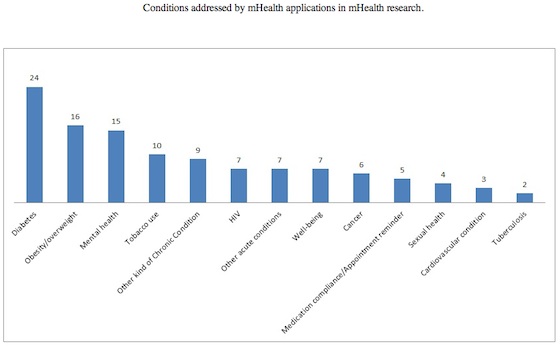 The volume of scientific research about mobile healthcare technology has grown as the field itself has exploded, but the quality and focus of academic studies has not kept pace with the speed of innovation, a review of 10 years' worth of published literature suggests.
The volume of scientific research about mobile healthcare technology has grown as the field itself has exploded, but the quality and focus of academic studies has not kept pace with the speed of innovation, a review of 10 years' worth of published literature suggests.
"Mobile technology, with its diffusion and characteristics, holds a great potential for health care applications. However the use of mobile phones in health care delivery has not been fully explored, and the diverse outcomes of mHealth have barely been documented," says a study appearing in the Journal of Medical Internet Research. "Although some literature reviews cover one part or the other of the field, an overall picture is still missing, possibly due to the field's constant evolution," according to a team of Swiss researchers.
"Studies are becoming more theoretically sound," corresponding author Maddalena Fiordelli, a postdoctoral research fellow at the Institute of Communication and Health at the University of Lugano, Switzerland, tells MobiHealthNews. "On the other hand," she adds, "it seems that research is not keeping up."
Notably, according to the paper, the number of English-language articles in scientific journals about mobile health nearly doubled between 2007 and 2008, coinciding with the introduction of the iPhone. "But there are not many studies about apps," Fiordelli says.
In fact, Fiordelli and two colleagues found not a single scientific paper published through early 2012 that evaluated a smartphone app in general release through an app store, just a few pieces of software developed "ad hoc" for research purposes. "So what is publicly available has not been evaluated, and what has been evaluated is not publicly available," the study notes.
"Newer and more advanced technologies were tested; however, the potential of smartphones does not seem to have been fully exploited yet," according to the study. "Indeed, half of the included studies applied very basic features of mobile phones, such as text messaging, which corroborates evidence already established in the field."
Furthermore, the bulk of the research during the 10-year review period looked at care of chronic diseases, with less than 20 percent each focusing on prevention and wellbeing or acute conditions. "[I]t would be advisable to explore the impact of mobile health for acute conditions as well," the researchers write.
"Because of their wireless cellular communication capability, mobile phones allow users to have continuous, interactive communication from any location. In our view, this characteristic of mobile phones makes them an ideal tool to address in real-time the specific needs of patients experiencing acute conditions."
On the positive side, the researchers report that more studies have focused on the impact mobile technology has had on health outcomes since the dawn of what they call the "new generation of smartphones" in 2007. Fiordelli says the scientific community needs to "evaluate really systematically what mobile health means for health."
She also would like future research to examine how mobile technologies can help the elderly, and plans on running such a study herself. "This could be really powerful in facing social isolation," Fiordelli says.















